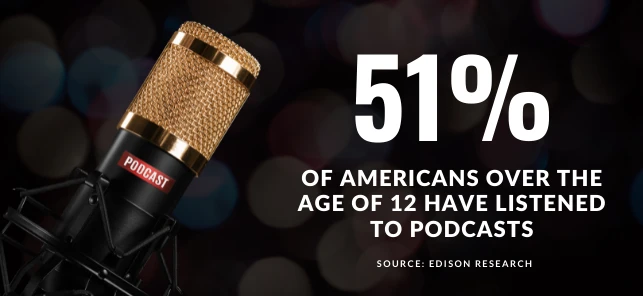Podcasting popularity is rising and a number of well known marketers have created podcasts to expand their brand. But even expert marketers are making amateurish podcasting mistakes due to a lack of organization and preparation.
These are the most common mistakes which affects the quality of the recording, the content that they are discussing and the number of listeners that they have.
Here, we will talk about the most common podcasting mistakes and how you can get organized to prevent them.
Common Podcasting Mistakes
Your Podcast is Too Broad
Some podcasters are not specific with the topics that they discuss. This doesn’t provide much value to the listeners who are looking for answers to specific questions in a niche. If you just create a general ramble about anything and everything, then you won’t attract many listeners to begin with, and you certainly won’t keep them.
You need to choose a specific niche and discuss a specific subject in that niche for each podcast. Think about each podcast episode as featuring a single theme in your chosen niche. Don’t be afraid to go specific – this is what your audience wants, and they will thank you for it by returning to your next podcast and spreading the word for you.
You’re Not Facing the Microphone
This is another common problem. You’re listening to a podcast and suddenly the volume of the speech drops off and then returns. Sometimes this happens several times in a single podcast.
What this usually means is the person delivering the podcast is not speaking directly into the microphone when the volume drops. The individual has turned his or her head away for some reason and not realized that this has affected the recording.
This happens most often when you’re following a script. You’re distracted by the script and not focusing on the microphone itself. Place the script in a position where you don’t have to turn your head to read it.

Lots of Errors in Recordings
Nothing will irritate your listeners more than a ton of mistakes in your podcasts. This can be anything from coughs and sneezes to heavy breathing to distracting background noises. There is really no excuse for this. With the equipment and software available today, the home podcaster can produce near perfect professional recordings.
When you have finished recording your podcast, you must listen to it intently from start to finish. You may think that it went perfectly, but it probably didn’t. Not many podcasters enjoy editing their recordings, but it has to be done. After all, that’s the only way to ensure the best podcasting experience for your listeners.
You’re Rambling
There are a lot of ramblers out there who choose to record their rambles and make them into podcasts. Experts in their subjects believe that they can just sit in front of the microphone and deliver a perfect podcast by winging it. This rarely works out well.
In reality, when you start rambling, you also start losing your audience.
The best way to avoid a ramble is to create a script. This can either be a full script or a script containing the important points that you want to cover. Think of it as an efficient outline. Make your podcasts to the point and easy to listen to, and your listeners will return for your next episode.
Your Interviews Have Echoes
Interviews conducted using Skype or some other online call app can often have an annoying echo. This is normally because you have listened to the caller using the speakers in your computer rather than headphones.
Use headphones for all of your podcast recording work. You can hear how everything sounds in real time and make any necessary adjustments. Don’t publish key online interviews that echo like crazy.
Plan & Prepare To Avoid Those Mistakes
We covered the five biggest and most damaging mistakes podcasters make above. They almost seem simple to prevent, don’t they? Well, that’s because they are.
The right preparation, organization and some practice, and you’ll be able to produce high-quality podcasts even from your garage (and no one will ever know).
Using a Script for Your Podcasts
Beyond just highly recommended, you absolutely must sit down and write a script for your podcasts when you’re first starting out. This is when you’re building your brand and creating your voice. You need to get it right!
In the beginning, you’ll want to produce a full script that includes everything you’re going to say. A complete run-through of your podcast will ensure that you don’t miss anything important. And it tends to prevent lulls, including the dreaded (and very annoying) “ums”, mumbling and off-topic rambling.
The only downside with a full script is it can kill spontaneity. After working with a full script for a while, you’ll get used to adding spontaneous elements to your podcasts and let your personality shine through.
The alternative to a full script is a “prompt” script. This is a script that just contains a series of pointers or prompts about what you need to talk about in your podcast. It’s basically an outline, as we discussed briefly above.
Once you have recorded a few podcasts using a full script, you can try a prompt script to see how well you do with it.
Plan Out Your Podcast Content
You need a plan of what you’re going to cover in your podcasts. Your goal should always be to provide solutions to the problems that people are experiencing in your niche. If you need to conduct some research to answer these questions correctly, then make sure that you do this. You can easily use Facebook Groups to source a dozen questions or so.
The best podcasts always provide value to the listeners. If you stop doing that, then you will lose your listener base. Needless to say, it’s essential that you determine what subject you’ll discuss for each podcast. Add value to the topic by providing useful tips and advice to your listeners.
Use a Calendar App to Plan and Organize Your Entire Podcast
There is a reason why companies have used editorial calendars for many years – they work! So we recommend that you use a calendar to organize the content and recording of your podcasts. There are many calendar apps available, but one of the best ones to use is Google Calendar. It’s also the most popular and, statistically speaking, you likely already use it.
Google Calendar is free, and you can use it to specify when you need to research and create the content for your podcast. You can add descriptions and notes to calendar events, and you can even attach files.
Remember, it’s critical that you adhere to a regular publishing schedule, so using a calendar app will help you to do this.






